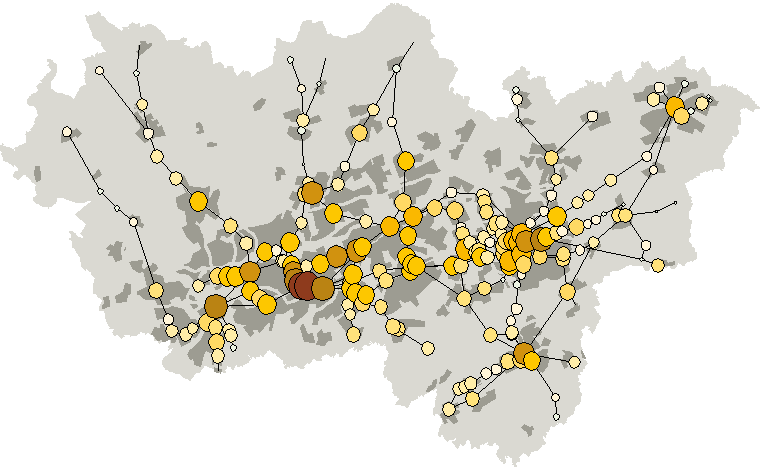Ruhr Area 2050: Modelling the Energy Transition in the Ruhr Area (2013-2016)
Cities are the largest consumers of energy and producers of greenhouse gases through heating, production and transport. At the same time, their high density makes them particularly vulnerable to negative consequences of climate change such as flooding and heat waves. With a population of over five million, the Ruhr region is one of the largest urban agglomerations in Europe. How can the ambitious greenhouse gas reduction targets of the federal and state governments be achieved? Current policy approaches in the Ruhr Area focus on small-scale measures to reduce energy consumption and greenhouse gas emissions and do not yet take a decisive enough approach to comprehensive climate protection strategies. Due to its industrial past and polycentric settlement structure, the Ruhr Area has great potential for the re-use of derelict industrial land and the development of traffic-reducing and energy-efficient settlement structures.
One reason for the neglect of this potential in the past is the lack of knowledge about the likely effects of land use, transport and other measures to reduce energy consumption and greenhouse gas emissions on land use, transport and the environment. Therefore, Stiftung Mercator, Essen, funded the Framework Programme for the Implementation of the Energy Transition in the Municipalities of the Ruhr Area to promote knowledge and problem awareness about the necessity and challenges of the energy transition in the municipalities of the Ruhr Area. The four-year programme included surveys, basic research projects, citizen participation and implementation studies.
The project Cities and Climate Change: Ruhr Area 2050 was part of this programme. In it, the IRPUD-Model of land use, transport and environment in urban regions, which had previously been used for the Dortmund city region, was extended to the entire Ruhr region and applied to estimate the effects of land use, transport and other measures to reduce energy consumption and greenhouse gas emissions on the economy, mobility, quality of life and environment in the Ruhr region up to the year 2050. For this purpose, the model was extended by sub-models for energy efficiency of buildings, electric mobility and car sharing and used to simulate scenarios that differ in their assumptions about future energy price increases and possible combinations of measures to reduce fossil energy consumption and increase energy efficiency and the use of renewable energy to achieve the energy policy goals of the state government of North Rhine-Westphalia.
The project was a collaboration with the Department of Environmentally Sustainable Infrastructure Planning, Urban Engineering at the University of Wuppertal and the Wuppertal Institute for Climate, Environment and Energy.
Further information on the entire framework programme is available on the homepage of the Wuppertal Institute http://www.energiewende-ruhr.de.
Reports
Reutter, O., Müller, M., Jansen, U., Schwarze, B., Spiekermann, K., Wegener, M., Huber, F., Brosch, K. (2017): Städte und Klimawandel: Maßnahmensteckbriefe. Wuppertal/Dortmund: Wuppertal Institut für Klima, Umwelt, Energie, Spiekermann & Wegener Stadt- und Regionalforschung, Bergische Universität Wuppertal.
Schüle, R. und Energiewende Ruhr Konsortium, u.a. Schwarze, B., Spiekermann, K., Wegener, M. (2017): Die Energiewende regional gestalten. Auf dem Weg zu einer Energiewende Roadmap im Ruhrgebiet. Wuppertal: Wuppertal Institut für Klima, Umwelt, Energie.
Schwarze, B., Spiekermann, K., Wegener, M., Huber, F., Brosch, K., Reutter, O., Müller, M. (2017): Cities and Climate Change: Ruhr Area 2050. Integrated Ruhr Area Model and Regional Modal Shift. Final Report. Dortmund/Wuppertal: Spiekermann & Wegener Urban and Regional Research, University of Wuppertal, Wuppertal Institute for Climate, Environment and Energy.
Schwarze, B., Spiekermann, K., Wegener, M., Huber, F., Brosch, K., Reutter, O., Müller, M. (2017): Städte und Klimawandel: Ruhrgebiet 2050. Integriertes Modell Ruhrgebiet und Regionaler Modal Shift. Abschlussbericht. Dortmund/Wuppertal: Spiekermann & Wegener Stadt- und Regionalforschung, Bergische Universität Wuppertal, Wuppertal Institut für Klima, Umwelt, Energie.
Brosch, K., Huber, F., Schwarze, B., Spiekermann, K., Wegener, M. (2014): Integriertes Modell Ruhrgebiet 2050: Stand der Forschung November 2014. Dortmund/Wuppertal: S&W/LUIS.
Brosch, K., Huber, F., Schwarze, B., Spiekermann, K., Wegener, M. (2014): Integriertes Modell Ruhrgebiet 2050: Projektbeschreibung Oktober 2014. Dortmund/Wuppertal: S&W/LUIS.
Progress in model development
Oktober 2015
April 2015
Januar 2015
September 2014
Juni 2014
April 2014
Journal articles
Reutter, O., Müller, M., Schwarze, B., Spiekermann, K., Wegener, M., Huber, F., Brosch, K. (2018): Verkehr verlagern! Szenarioanalysen zu Modal-Shift-Potenzialen im Personenverkehr im Ruhrgebiet 2050. Straßenverkehrstechnik 01/2018, 7-18.
Conferences
Wegener, M., Schwarze, B., Spiekermann, K., Brosch, K., Huber, F., Müller, M., Reutter, O. (2018): Modelling the great transformation in the Ruhr Area. Referat auf der Konferenz Urban Mobility – Shaping the Future Together mobil.TUM 2018, München, 13.-14. Juni 2018.
Brosch, K., Huber, F., Schwarze, B., Spiekermann, K., Wegener, M. (2016): Integrierte Stadtmodellierung: Flächennutzung, Verkehr, Energie, Umwelt. Referat auf der Dortmunder Konferenz Raum- und Planungsforschung 2016: Raummuster – Struktur, Dynamik, Planung, TU Dortmund, 22.-23. Februar 2016.
Vorläufige Ergebnisse des Projekts auf der Zwischenkonferenz des Rahmenprogramms am 17.Juni 2015 im LWR-Insdustriemuseum Oberhausen.
Schwarze, B., Spiekermann, K., Wegener, M. (2015): Are polycentric cities morte energy-effiient?. Referat auf der internationalen Konferenz Polycentric City Regions in Transformation – The Agglomeration Ruhr in International Perspective, Zeche Zollverein, Essen, 11.-13. Juni 2015.
Huber, F., Schwarze, B., Spiekermann, K., Wegener, M. (2013): Modelling the energy transition in cities. Referat auf der 13th International Conference on Computers in Urban Planning and Urban Management, Utrecht, 2.-4. Juli 2013.
Fuerst, F., Wegener, M. (2013): Energy efficiency of buildings: a new challenge for urban models. Referat auf dem Applied Urban Modelling Symposium (AUM 2012), Universität Cambridge, 24.-26. Juni 2012.
Huber, F. Brosch, K. (2011): Nachhaltige Verkehrsinfrastruktur Ruhr 2050. Referat auf dem Städtebaulichen Kolloquium der Fakultät Raumplanung, TU Dortmund, 8. November 2011.
Wegener, M. (2011): Nachhaltige Mobilität durch Polyzentralität. Referat auf dem Städtebaulichen Kolloquium der Fakultät Raumplanung, TU Dortmund, 8. November 2011.

